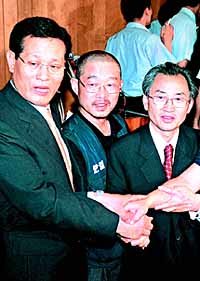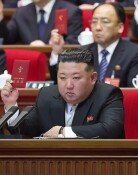Financial reform will resume

It is expected that the financial reform will resume. With the compromise between the government and the Korean Financial Industry Union, a framework of the financial restructuring was built. What is left is to tackle the issues one by one in order to sharpen the competitiveness of the nation`s financial industry to the international level.
First of all, the biggest obstacle in second-phase financial restructuring has been removed. The government and the trade union agreed to pursue enactment of financial holding company system by the year-end as scheduled, so the restructuring is expected to be carried forward promptly. The decision to retract the limit of deposit guarantee is another factor that would speed up the projected reform.
Choi Heung-Shik, vice president of the Korea Institute of Finance, commented it that has a significant meaning that the union accepted the financial holding company system, which is vital to sharpen the industry`s overall competitiveness.
Still, voluntary merger and subsequent layoff would be inevitable, so it is expected to cause troubles.
-Integration of banks under a holding company: With the agreement between the government and the union, the financial holding company law is likely to pass the National Assembly without any trouble. The government said that the restructuring of banks, on which the government poured public fund, will be handled under its initiative. So, it is expected that Hanvit Bank, Cho Hung Bank and Korea Exchange Bank will be merged under the financial holding company that will be newly established.
The government will execute its right as a leading shareholder to invest its ownership in those banks where it poured public fund, but it would forcibly integrate them. Originally, the government considered two ways of driving a merger or seeing its own survival of the bank that will be integrated under the financial holding company. With the union`s opposition, however, the merger approach has been removed.
Regional banks, which fail to normalize operation through its own efforts such as introduction of foreign investment and increasing profits, also are likely to be merged under the financial holding company after the government pour public fund.
High-ranking officials of the Ministry of Finance & Economy said that the non-performing assets of the banks that the government poured public fund will be handed over to bad bank, then the bank`s share price may rise substantially, adding that it would make the government easy to collect its investment. He said that financial holding company will be listed on the Korea Stock Exchange or sell its equity.
-Voluntary merger among banks is possible: Merger among banks with no government ownership is possible. The government plans to offer tax incentives and financial aid to those banks, so the integration among local financial institutions for survival is an open possibility. Rumors spread in the market that Hana Bank and KorAm Bank would merge and details of such a scenario will be available in the second half of the year. But, layoffs would be inevitable in such a process, although the union is worried about it. Government officials said that it is natural to lay off workers to sharpen international competitiveness, noting that banks with input of public fund would also voluntarily decide their own layoff to the minimum extent.
For this reason, the projected layoff may not be as massive as in case of closure of duplicate branches, but the status guarantee asked by the union is gone.
-Reduction in the ceiling of deposit guarantee: Revision of the depositor protection law will be implemented from next year as scheduled, although the ceiling of deposit protection in case of financial institution`s bankruptcy will be reduced.
Officials of the Ministry of Finance & Economy said that the ceiling of protection will be adjusted in a flexible manner according to the pace of financial reform and move of capital in the market, hinting that the limit will be slightly raised from the current 20 million won. The setback in depositor protection is expected to accelerate the move of fund to blue-chip banks, thus promoting restructuring of banks through the market force.







